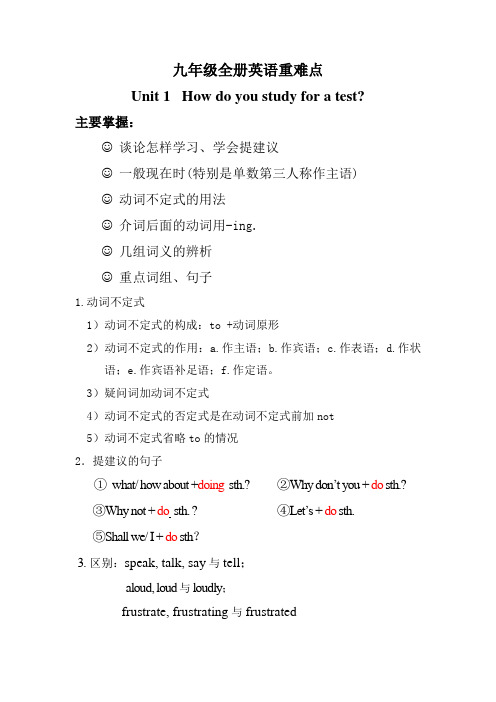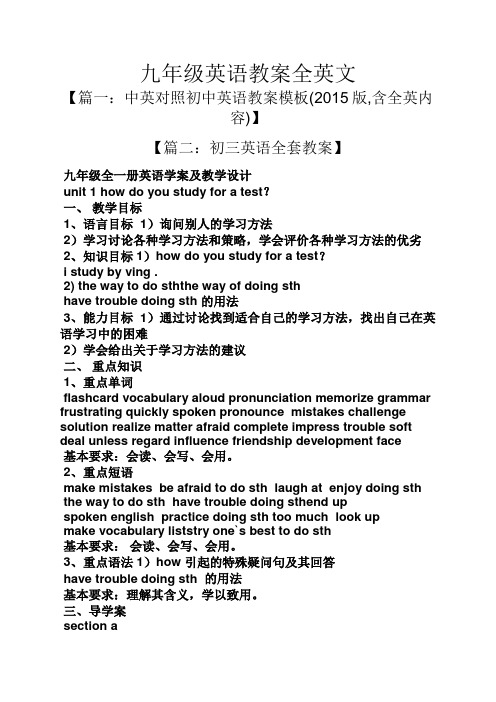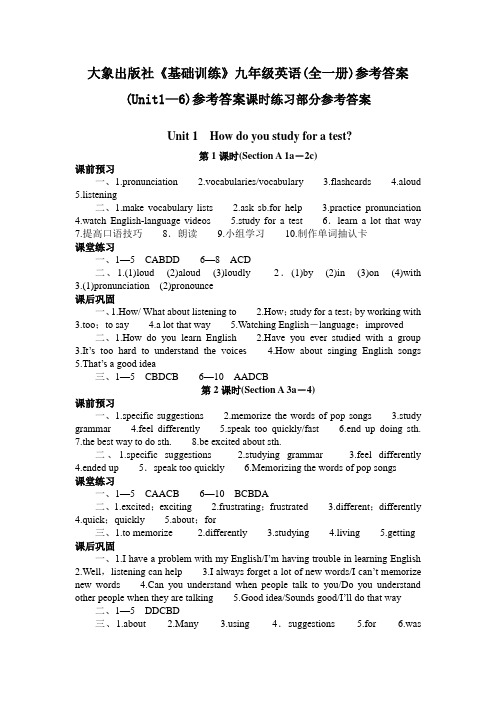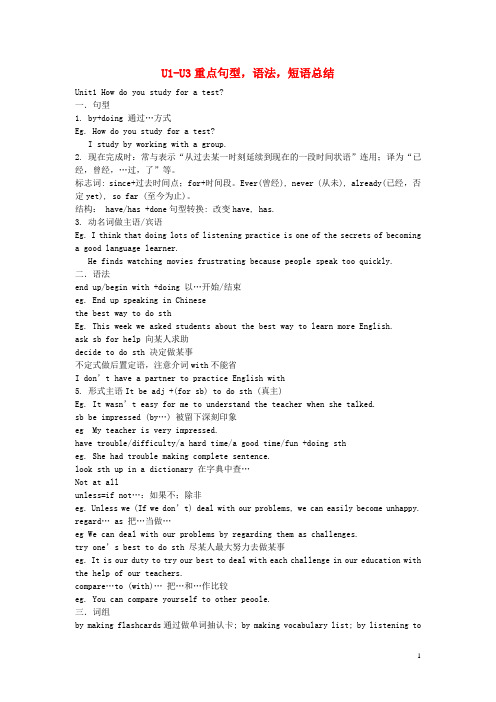九年级英语全册 Unit 1 How do you study for a test?Section B(1a-2c)导学案
九年级英语全册《Unit 1 How do you study for a test(第1课时)》学

wordUnit1 How do you study for a test[学习目标]掌握重点单词和短语:aloud 高声地 pronunciation 发音 differently 不同地 quickly快地,迅速地 excited 激动的not at all 根本不 end up 结束 get excited about 对…感到兴奋 frustrate 使希望,使沮丧掌握重点句型:How do you study for a test ?I study by working with a group(2) What about reading to practice pronounciation?3.语法:how 用于询句“怎样”和by用于“告诉别人怎样做某事”时的用法4.运用已学知识与他人谈论如何学习第一课时(1a——2C)课前预习,预习时把这些题给做了,试试你的身手呀!翻译下列短语Work with fri带__________________MA大声朗读练习发音__________________9.study for a test_______________向警察寻求帮助____________________10.learn a lot__________________用所给词的适当形式填空。
You can find your purse by_________(ask)the police for help.It ‘s a fine day.What about __________(go)out for a walk?It’s a good way to practice ____________(speak)English every day.If you want to improve your______________(pronounce).you must speak more English.Talking with my friends in English can improve my _________(speak)skills.It’s too hard________________(understand)the voices.[重点点拨]aloud 为副词,意为“出声地,大声地”提高声音为了让人们能听见,loud为“响亮的”,指说话声和笑声等很响亮常用比较级形式lounder,loundly“大声地,吵闹地“指人的声音,敲门声等,强调声音高,比较喧闹,不悦耳令人感到讨厌。
九年级全册重难点

九年级全册英语重难点Unit 1 How do you study for a test?主要掌握:☺谈论怎样学习、学会提建议☺一般现在时(特别是单数第三人称作主语)☺动词不定式的用法☺介词后面的动词用-ing.☺几组词义的辨析☺重点词组、句子1.动词不定式1)动词不定式的构成:to +动词原形2)动词不定式的作用:a.作主语;b.作宾语;c.作表语;d.作状语;e.作宾语补足语;f.作定语。
3)疑问词加动词不定式4)动词不定式的否定式是在动词不定式前加not5)动词不定式省略to的情况2.提建议的句子①what/ how about +doing sth.? ②Why don’t you + do sth.?③Why not + do sth. ?④Let’s + do sth.⑤Shall we/ I + do sth?3.区别:speak, talk, say与tell;aloud, loud与loudly;frustrate, frustrating与frustrated4. 介词by , with, in , on表方式:by+交通工具(注意不带冠词),by+doing sth通过…方式;with+工具,with a pen,with+人体部位, with our eyes;in +语言,in English,in+物质材料,in ink(墨水)=by pen;on+电器或媒介 on TV5.重点词组、句子词组:not at all 一点也不根本不 end up doing sth结束做某事by mistake 由疏忽,健忘等所致错mistake…for 把…错认为… and no mistake 无疑地,的确 make no mistake 别弄错be afraid of doing sth.害怕做了某事too…to太…而不能…be afraid to do sth.害怕去做某事enough to 足以能够be afraid that恐怕、担心,表示委婉语气What about+~ing/How about+~ingget excited about =be/become interested in对…感到兴奋(有趣)make up one’s mind打定主意with the help of sb. == with one’s help 在某人的帮助下instead of sth. / doing sth. 代替,而不是be / get excited about sth.= be/get excited about doing sth.= be excited to do sth. 对…感兴奋句子:1.How do you study for a test? 你怎样为考试做准备?2.I have learned a lot that way. 用那种方法,我已经学到了很多东西。
九年级英语教案全英文

九年级英语教案全英文【篇一:中英对照初中英语教案模板(2015版,含全英内容)】【篇二:初三英语全套教案】九年级全一册英语学案及教学设计unit 1 how do you study for a test?一、教学目标1、语言目标 1)询问别人的学习方法2)学习讨论各种学习方法和策略,学会评价各种学习方法的优劣2、知识目标1)how do you study for a test?i study by ving .2) the way to do sththe way of doing sthhave trouble doing sth 的用法3、能力目标 1)通过讨论找到适合自己的学习方法,找出自己在英语学习中的困难2)学会给出关于学习方法的建议二、重点知识1、重点单词flashcard vocabulary aloud pronunciation memorize grammar frustrating quickly spoken pronounce mistakes challenge solution realize matter afraid complete impress trouble soft deal unless regard influence friendship development face基本要求:会读、会写、会用。
2、重点短语make mistakes be afraid to do sth laugh at enjoy doing sth the way to do sth have trouble doing sthend upspoken english practice doing sth too much look upmake vocabulary liststry one`s best to do sth基本要求:会读、会写、会用。
3、重点语法 1)how 引起的特殊疑问句及其回答have trouble doing sth 的用法基本要求:理解其含义,学以致用。
大象出版社《基础训练》九年级英语(全一册)参考答案(Unit1—6)

大象出版社《基础训练》九年级英语(全一册)参考答案(Unit1—6)参考答案课时练习部分参考答案Unit 1How do you study for a test?第1课时(Section A 1a-2c)课前预习一、1.pronunciation 2.vocabularies/vocabulary 3.flashcards 4.aloud5.listening二、1.make vocabulary lists 2.ask sb.for help 3.practice pronunciation4.watch English-language videos5.study for a test6.learn a lot that way 7.提高口语技巧8.朗读9.小组学习10.制作单词抽认卡课堂练习一、1—5CABDD6—8ACD二、1.(1)loud(2)aloud(3)loudly2.(1)by(2)in(3)on(4)with3.(1)pronunciation(2)pronounce课后巩固一、1.How/ What about listening to 2.How;study for a test;by working with3.too;to say4.a lot that way5.Watching English-language;improved二、1.How do you learn English 2.Have you ever studied with a group3.It’s too hard to understand the voices4.How about singing English songs5.That’s a good idea三、1—5CBDCB6—10AADCB第2课时(Section A 3a-4)课前预习一、1.specific suggestions 2.memorize the words of pop songs 3.study grammar 4.feel differently 5.speak too quickly/fast 6.end up doing sth.7.the best way to do sth.8.be excited about sth.二、1.specific suggestions 2.studying grammar 3.feel differently4.ended up 5.speak too quickly 6.Memorizing the words of pop songs课堂练习一、1—5CAACB6—10BCBDA二、1.excited;exciting 2.frustrating;frustrated 3.different;differently4.quick;quickly5.about;for三、1.to memorize 2.differently 3.studying 4.living 5.getting 课后巩固一、1.I have a problem with my English/I’m having trouble in learning English2.Well,listening can help3.I always forget a lot of new words/I can’t memorize new words4.Can you understand when people talk to you/Do you understand other people when they are talking5.Good idea/Sounds good/I’ll do that way二、1—5DDCBD三、1.about 2.Many ing 4.suggestions 5.for 6.was7.memorizing8.also9.When10.never第3课时(Section B 1a-2c)课前预习一、1.make mistakes in sth. 2.spoken English 3.join an English (language) club 4.practice speaking English 5.how to use commas6.write in the notebook二、1—5BDCAE课堂练习一、1—5BCBCD6—8BCB二、1.spoken 2.slowly 3.pronounces 4.stay;have 5.to spend6.playing 7.solutions三、1.in 2.in 3.with/about/to 4.in 5.for 6.about7.about 课后巩固一、1—5BCABB6—10ADCAD二、1—5DCBAC第4课时(Section B 3a-4)课前预习1.learn to do sth. 2.first of all 3.It doesn’t matter. 4.be afraid to do sth. 5.laugh at sb. 6.take notes7.make complete sentences8.have trouble doing sth. 9.decide to do sth.10. enjoy like doing sth.课堂练习一、1—5BDBCD二、1.finding 2.walk 3.talking4.quickly ing三、1.(1)say(2)tells(3)say(4)talking(5)say(6)talk(7)speaking(8)speak 2.(1)another(2)the other(3)other(4)others四、1.of facing ter on 3.no;finding 4.decided to课后巩固一、1.to take lots of grammar notes ter on;realized 3.one of the secrets 4.am impressed/moved 5.is afraid to;laugh at 6.First of all;learn to二、1.C 2.②B③A 3.对于某些阅读材料,你必须随时变换阅读速度,从快到慢,从慢到快。
九年级全册 U1U3重点句型,语法,短语总结 人教新目标版

U1-U3重点句型,语法,短语总结Unit1 How do you study for a test?一.句型1. by+doing 通过…方式Eg. How do you study for a test?I study by working with a group.2. 现在完成时:常与表示“从过去某一时刻延续到现在的一段时间状语”连用;译为“已经,曾经,…过,了”等。
标志词: since+过去时间点;for+时间段。
Ever(曾经), never (从未), already(已经,否定yet), so far (至今为止)。
结构: have/has +done句型转换: 改变have, has.3. 动名词做主语/宾语Eg. I think that doing lots of listening practice is one of the secrets of becoming a good language learner.He finds watching movies frustrating because people speak too quickly. 二.语法end up/begin with +doing 以…开始/结束eg. End up speaking in Chinesethe best way to do sthEg. This week we asked students about the best way to learn more English.ask sb for help 向某人求助decide to do sth 决定做某事不定式做后置定语,注意介词with不能省I don’t have a partner to practice English with5. 形式主语It be adj +(for sb) to do sth (真主)Eg. It wasn’t easy for me to understand the teacher when she talked.sb be impressed (by…) 被留下深刻印象eg My teacher is very impressed.have trouble/difficulty/a hard time/a good time/fun +doing stheg. She had trouble making complete sentence.look sth up in a dictionary 在字典中查…Not at allunless=if not…:如果不;除非eg. Unless we (If we don’t) deal with our problems, we can easily become unhappy. regard… as 把…当做…eg We can deal with our problems by regarding them as challenges.try one’s best to do sth 尽某人最大努力去做某事eg. It is our duty to try our best to deal with each challenge in our education with the help of our teachers.compare…to (with)… 把…和…作比较eg. You can compare yourself to other peoole.三.词组by making flashcards通过做单词抽认卡; by making vocabulary list; by listening totapes; by reading the textbook; by asking the teacher for help; by watching English-language videos; by practicing conversation with friends; by reading aloud to practice pronunciationkeep an English notebook / take notes记英语笔记/记笔记read aloud 朗读that way (=in that way) 通过那种方式improve my speaking skills提高我的会话技巧have conversations with friends与朋友对话get excited 高兴,激动do/make a survey about… 做有关…的调查spoken English (= oral English) 英语口语make mistakes in sth在…犯错误get the pronunciation right 使发音准确get a lot of /much writing practice 得到大量写作练习first of all/at first 首先later on 随后write down 写下,记下make up conversations 编写对话all over/around the world 全世界deal with 对待,处理,解决worry about (be worried about) 担心,担忧be angry with / be mad at生某人的气; be/stay/keep angry 生气go by 消逝 Time goes by. 时光飞逝complain about/of 抱怨…with the help of 在…的帮助下change…into… 把…变成… (= turn into)face the challenges 面对挑战break off a friendship中断一场友谊Unit 2 I used to be afraid of the dark.一.句型1. used to + do/be 过去常常… 否定:didn’t use to; don’t use to 疑问:did…use toEg. You used to be short, didn’t you?be/get used to doing 习惯于…eg. I used to traveling by air.2. in(during) the last(past) few years 在过去的几年里, 用于现在完成时Eg. My life has changed a lot in the last few years.3. not …anymore=no more not…any longer=no longerEg. I don’t have time anymore.= I no more have time.4. seem + adj / to do/ that(从句)It (必须it作主语)seems that she has changed a lot.She seems (like) to have changed a lot.5. pride(n)/proud(adj)A is proud of B= A takes pride in B: A以B为骄傲B is the proud of A: B 是A 的骄傲Eg. Her daughter is the proud of her.She is proud of/takes pride in her daughter.6. 感叹句How+ adj + 主语+谓语!eg. How beautiful she is!What + n + 主语+谓语! What a beautiful girl she is!二.语法with …on/offEg. I go to sleep with my bedroom light on.be afraid of = be terrified of= be afraid to doEg. I used to be afraid of going outside at night.spend/takeafford to do sth 能够负担起…eg. His mother couldn’t afford to pay for her child’s education. patient: be patient with sb 对…有耐心even though, even if:即使…让步状语从句(有时遵循主将从现)eg. Even though/if it rains, he will go to school.三.词组be more interested in 对…更感兴趣.on the swim team 游泳队的队员.worry about. 担心in the past 在过去(过去式)all the time 一直, 总是chat with 与…闲聊hardly ever 几乎从不,很少(表否定)stressed out 紧张,压力大head teacher 校长cause/make a lot of trouble 制造许多麻烦get into trouble with 与…遇到麻烦make a (difficult) decision 做出决定to one’s surprise 使某人吃惊的是to do this 为了做到这一点(常做状语)as well as one can 尽可能的做好pay attention to 留心, 注意consist of 由…组成/构成.instead of 代替, 而不是in the end; at last; finally最后, 终于give up doing sth 放弃做某事feel good about oneself 觉得很棒daily life 日常生活Unit 3 Teenagers should be allowed to choose their own clothes. 句型被动语态: sth be +done by sbeg. Football is played by people in most countries.含有情态动词的被动语态should/can(not) + be doneeg. Teenagers should be allowed to choose their own clothes.instead, instead of 代替,而不是eg: They are not studying. They are chatting with each other instead.They are chatting with each other instead of studying.so +be/助动词/情态动词(取决于上句的谓语动词,单复数取决于后面的主语)+另一主语表“也是如此”。
【全效学习】九年级英语全册 unit 1 how do you study for a test

Unit 1 How do you study for a test?第五课时Selfcheck 复习课课型一.背记本节课单词和词组1.查阅;查找(词组)2.软的;柔软的a.3.编造;拼凑成(词组)4.文章;短文n.二.动词填空(译汉feel _______; spell________; write down________; join_______; find________)1.You should________ new English words in a vocabulary list.(译汉: )2.If you don’t know how to__________ new words, look them up in a dictionary. (译汉: )3.The best way to improve your English is to__________ an English club.(译汉: )4.Another thing that he________ very difficult was English grammar.(译汉: )5.This kind of paper_________ very soft.(译汉: )三.写作:My ways to learn English.My ways to learn English.There are many ways to learn English, but everyone should have his or her own way. I have ways to learnEnglish.___________________________________________________________________________________________________________________________________ _______________________________________________________________________________ _______________________________________________________________________________ _______________________________________________________________________________ _______________________________________________________________________________ _______________________________________________________________________________ _________________________________________________________________________Unit 1 How do you study for a test?第六课时Reading 阅读课课型How do we deal with our problems?Rich or poor, young or old, we all have problems. And unless we deal with our problems, we easily become unhappy. Worrying about our problems can affect how we do at school. It can also influence the way we behave with our families. So how do we deal with our problems? There are many ways.By learning to forgetMost of us have probably been angry with our friends, parents or teachers. Perhaps they said something you didn't like, or you felt unfair. Sometimes, people can stay angry for years about a small problem. Time goes by, and good friendships may be lost.When we are angry, however, we are usually the ones affected. Perhaps we have seen young children playing together. Sometimes they have disagreements, and decide not to talk to each other. However, this usually does not last for long. This is an important lesson for us: we can solve a problem by learning to forget.By regarding problems as challengesMany students often complain about school. They might feel they have too much work to do sometimes, or think the rules are too strict. We must learn how to change these "problems" into "challenges". Education is an important part of our development. As young adults, it is our duty to try our best to deal with each challenge in our education with the help of our teachers.By thinking of something worse.By comparing yourself to other people, you will find your problems are not so terrible. Think about Stephen Hawking, for example, a very clever scientist, who regards his many physical problems as unimportant. He can't walk or even speak, but he has become very famous and successful. We are probably quite healthy and smart. Let's not worry about problems. Let's face the challenges instead.根据短文内容判断下列的正误(正T,误F)()1.There are three ways to deal with our problems in this passage.()2.Only the poor in the world has problems.()3.If we have a fight with friend, we can solve the problem by learning to forget.()4. As young adults, we should try our best to deal with each challenge in our education with the help of our teachers.()5.When we meet the problems, we don’t worry about it and we should face the challenges instead.二、Unit1 Reading 的单词记忆1.处理;应付v.2.▲处理;应付(词组)3.如果不;除非conj.4.不公正的;不公平的a.5.解决;解答v.6.将……视为v.7.责任;义务n.8.容易地;简单地a.9.影响;对……起作用v.10.▲生……的气;对……感到气愤(词组)11.▲时间过去;消逝(词组)12.友情;友谊n.13.失去;丧失v.14.分歧;意见不合n.15.发展;进展n.16.成年人n.17.▲尽力做某事(词组)18.不重要的a.19.面临;面对v.20.军人;士兵n.21.▲突然中断(词组)22.心理学家;心理学研究者n.23. ▲在某人的帮助下(词组)24.▲抱怨(词组)25.▲担心;担忧(词组)26.▲面对挑战(词组)三、考点检测1.尽最大的努力保护环境是我们的责任。
九年级英语全册中考必考句子完整版
最新九年级英语全册中考必考句子完好版Unit1必背要点句子-----Howdoyoustudyforatest?你怎么为考试而学习?-----Bymakingvocabularylists/Byaskingtheteacherforhelp经过制作词汇列表/经过向老师追求帮助Whataboutreadingaloudtopracticepronunciation?高声阅读来练习发音怎么样?4. Idon’tknowhowtoseucommas.我不知道怎么用逗号特别疑问词+todoWhydon’tyoujoinanEnglishclubtopracticespeakingEnglish?你为何不参加英语俱乐部练习英语呢?a.whydon ’t you=whynotb.join+人/党派/集体joinin+活动c.practicedoingsthIdon’thaveapartnertopracticeEnglishwith我.没有伙伴一同练英语。
近似句型Idon’thaveapapertowriteonI.don’thaveapentowritewith. Sheaddedthathavingconversationswithfriendswasnothelpfulatall.她增补说和朋友们谈话一点都没有帮助。
8.WegetexcitedaboutsomethingandthenendupspeakinginChinese.在某些事情上我们越谈越起劲,最后干脆用中文说。
9. Imakemistakesingrammar在.语法方面,我频频犯错。
teron,Irealizedthatitdoesn ’tmatterifyoudon’tunderstandeveryword.随后我认识到假如没法每个单词都弄理解,那也不碍事。
11.SoIdecidedtotakelotsofgrammarnotesineveryclass.所以我决定每节课多做些语法笔录。
【人教版】九年级英语上册《Unit1Howdoyoustudyforatest?》方法技巧
UNIT 1 How do you study for a test?方法技巧1.动名词的用法同学们也许对动名词的提法并不感到陌生,但相信大家对它并没有全面而细致的了解,现在我们就一起来学学动名词吧!动名词是由v.+ing 构成的,变化规则和现在分词一样。
动名词具有名词的性质,在句中可以作主语、宾语和表语等。
同时,它又具有动词的特点,可以接宾语构成动名词短语。
动名词所作句子成分例句主语Seeing is believing.眼见为实。
宾语We all like singing.我们都喜欢唱歌。
表语Your task is cleaning the room.你的任务是打扫房间。
定语Our school has a r eading room.我们学校有一个阅览室。
教你一招:巧记只跟动名词作宾语的动词或词组,有些动词或词组只跟动名词作宾语,你能快速掌握它们吗?请试试下面的顺口溜吧!学习英语有点难,忙于放弃摆面前(be busy,give up),不禁期望你喜欢(can’t help,look forward to,enjoy),介意作业做不完(mind,finish),优美文章值得看(be worth),继续练习莫推延(keep on,practice,put off)。
2. 议论文三部曲议论文是以议论为主要表达方式,通过摆事实、讲道理表明作者见解或主张的一种文体。
在近几年的中考试题中,出现了不少写议论文的题目。
写议论文需要确立论点,并辅之以充分的论据加以论证。
论点、论据和论证被称为议论文的三要素。
在英语议论文的写作中,应注意三个事项:(1)论点的基本要求是观点正确、认真概括、有实际意义。
(2)论据的基本要求是真实可靠、充分典型。
(3)论证的基本要求是推理符合逻辑。
英语议论文的结构一般较为固定,通常包括三个部分:(1)导语在导语部分提出需要议论的议题。
(2)正文在正文部分对所提出的论点进行论证。
(3)结论在结论部分对以上的论证进行总结和归纳。
初中英语九年级Unit1Howdoyoustudyforatest?第一课时英文教案
Unit1 How do you study for a tes?tI . Analysis of the Teaching MaterialsIn this unit, students learn to talk about how to study. Such topic is very useful to students. It ' s helpful to raise learning interest of all the students. Either more orless advanced students will benefit a lot.1. The first period mainly gives students listening and oral practice using the targetIanguage "How do you study for a text? I study by doing . …"2. The second period gives students more listening and oral practice using moretarget Ianguages. They are heIpfuI to improve students ' Iistening and speakingskiIIs.3. In the third period, students Iearn to get detaiIed information from an articIe. Itis a basic reading skiII and is a great heIp to improve students iIIs. ' reading sk4. The fourth period not onIy introduces some new words but aIso providesstudents with many different kinds of activities. In this cIass, students Iearn to give advice to those who have difficuIty in studying .5. The fifth period is designed to train students ' reading and writing skiIIs. n . Language Function TaIk about how to study.川.Target Language1. How do you study for a test?I study by working with friends.2. Have you ever studied with a group?Yes, I have. I 've Iearned a Iot that way.3. I don 't have a partner to pracEtinsgeIish with.Maybe you shouId join an EngIish Ianguage cIub.IV. Structureverb + by\ with gerundV . VocabularyfIashcard, take notes, frustrating, memorize, aIoud, comma, make mistakes, pronunciation, be afraid to,What about … ? Why don 't you … ?W. Teaching TimeFive periodsThe First PeriodI . Teaching Aims1. Key VocabuIary: fIashcard2. Target Language: How do you study for a test?I study by working with a group.n . Teaching key PointTaIk about how to study foa a test.川.Teaching MethodTask-based approachV . Teaching Aids1. A tape recorder2. Real objectsV. Teaching ProceduresStep I GreetingsT: Did you have a good time during the summer holidays?Where did you go? What did you do?Ask some students to describe their summer holidays.Step n Lead-inT: Is today a special day?( Lead the students to answer: It's the first day of the new term)T: What are your new term's resolutions?( Lead the students to answer: I'm going to get good grades.)T: Last term,Wang Linyuan and Zhao Ting got good grades in English; 'lsetask them how to study English well.T: Wang Linyuan, how do you study for an English test?( With the short conversations between the teacher and the students,the teacher lead in the new text ------------------------ h ow to study for a text. )Step 山 Teach 1aT: How do you study for a test? (Write on the blackboard)S: I study for a test read the textbook.Teacher correct the answer: Oh, you study by reading the textbook.(Let students give different answers,and emphasizeverb+by\with gerund. )1. Show some real things, like flashcards,tapes, the textbook and vocabulary lists,to introduce theways in 1a.2. Ask the students to tell other ways of learning English.Sample answersa. by joining a study groupb. by practising conversations with my friendsc. by reading aloud every morningd. by watching English-language TVNote:A flashcard is a piece of paper or card which students write a word on and use it to memorizeinformation.Step IV 1bThis activity provides students practice in understanding the target language in spokenconversation.1. Let the students look at the pictures in 1b,ask them to tell the ways of learning:by making flashcards, by listening to tapes,by asking the teacher for help2. listen to the tape, let students write the correct letters.(Combine the listening task and speaking task.)T: You will hear one conversation. You are asked to write the letter of each picture in front of the name of the person who studies that way.Point out the sample answer to the class.T: Mei says, "I study by making flashcards. "so the answer to number 1 is a.Play the recording for the first time.Students only listen. Play the recording a second time. Students write down their answers. Check the answers with the whole class.Answers1. a2. c3. bStep V 1cThis activity gives students oral practice using the target language.Read the instructions to the class.1. Invite a pair of students to read the conversation to the class, S1: How do you study for a test?S2: I study by working with a group.2.Write the conversation on the blackboard. Then demonstrate a new conversation with anotherstudent.T: How do you study for a test?S3: I study by making flashcards.3. Students work in pairs ,and exchange the ways of studying.As students work, teacher walks around and helps with pronunciation as needed.4. Ask pairs of students to come to the front of the classroom and act out their conversations. Step W SummaryT: In this class, we ' ve learned some key vocabularyrdws,osuch as flashcard.And we've also learned the target languasge How do you study for a test? I study by working with a group.Step VD HomeworkAsk students to interview students in other classes, family members, and friendsto try to discover some new ways of studying that haven ' t been introduced in the book or in class. Step Vffl Blackboard DesignUnit 1 How do you study for a test?Section AThe First Period1. Target languagesA: How do you study for a test?B: I study by working with a group.2. Ways of studying:by working with Friendsby making flashcardsby reading the textbookby making vocabulary listsby listening to tapesby asking the teacher for help。
福建省长泰县第一中学九年级英语全册《Unit 1 How do you study for a te
Unit 1 How do you study for a test?一、教学目标1、谈论如何学习英语。
(talk about how to study English)2、学习用“动词+by+doing”表示表示“方式、方法。
”(by doing)3、复习现在完成时。
(have/has+done)4、复习提建议的方法。
(What about ...? Why don't you...?)5、学习一些重点词组。
(key phrases)二、单元内容的概述(一)单词名词类:pronunciation, voice, skill, grammar, ma, challenge, sentence, learner, speaker, solution, secret, term, service, status, symbol, expert, tun e.动词类:memorize, frustrate, add, pronounce, plete, ring, impress.形容词类:specific, frustrating, excited, spoken, native, mobile, ashamed, old-fas hioned, outdated, fashionable, latest, embarrassed, main.副词类:aloud, differently, quickly, slowly, fast, actually, easily.[重点词组](key phrases)(一)词组1、not at all 一点也不2、end up (doing) sth 结束做某事3、make mistakes 犯错4、later on 后来5、be afraid to do 害怕做某事6、laugh at 嘲笑(某人)7、take notes 作笔记8、enjoy doing sth 喜欢做某事9、make up 组成10、mobile phone 移动,手机11、on one's way to 在某人去某地的路上12、be shamed of 因...感到惭愧13、behind the times 过时的,老式的14、turn off 关掉(电视、收音机、电灯等)15、worst of all 最的是16、fit in with sb 与某人相处融洽17、native speaker 说本族语的人18、begin with 以...开头19、the best way to do...... 做某事最好的办法20、write down 写下,记下21、once more 又一次,再一次22、first of all 首先23、give up 放弃24、think about 考虑25、at the time 当时26、make sb do sth 使某人做某事27、send fast/short messages 发快/短信28、status symbol 身份的象征29、spend... on sth 在...花费(时间,金钱)30、if... or not 是否31、be with sb 与某人在一起32、get excited about 对...感到(二)句型1、How do you study for tests?Well, I study by working with my classmates.2、Have you ever studied with a group?Yes, I have. I've learned a lot that way.3、I don't have a partner to practice English with.Maybe you should join an English club.4、What about reading aloud to practice pronunciation?5、Why don't you join an English language club?【重难点讲解】(一)重点词汇1、voice n. 说话声;声音(the sound that are made when people speak or sing)eg. He spoke in a quite (loud/angry/kind) voice.他悄声/大声/生气/友好地讲话。
- 1、下载文档前请自行甄别文档内容的完整性,平台不提供额外的编辑、内容补充、找答案等附加服务。
- 2、"仅部分预览"的文档,不可在线预览部分如存在完整性等问题,可反馈申请退款(可完整预览的文档不适用该条件!)。
- 3、如文档侵犯您的权益,请联系客服反馈,我们会尽快为您处理(人工客服工作时间:9:00-18:30)。
Unit 1 How do you study for a test?Section B(1a-2c)【学习目标】1.掌握单词(pronounce spoken slowly mistake challenge solution ),短语(make mistakes , solution to .. ).2.通过预习,小组讨论,提高阅读能力。
【使用说明】一、自学1.单词拼读—记忆—深入发音______ 口头的______ 缓慢地_____ 错误______ 挑战______ 解决方案______二、正课1.课前检测2.处理听力3.导学案探究释疑。
4.学以致用5.整理巩固知识点拨1.spoken 口头的 spoken English = oral English 口语2. mistake 错误过失可数名词make a mistake = make mistakes 犯错误make mistakes in sth / doing sth 在某方面犯错误如 He often makes mistakes in grammar.mistake A for B 把A 误认为B如 I often mistake him for his brother. 我经常把他误认为他弟弟。
by mistake 如I took your pen by mistake.3..solution 解决解答名词 the solution to the problem 问题的解决方案the answer to the question 问题的答案the key to the door 门的钥匙solve 解决解答动词 solve the problem 解决问题4.challenge 挑战 face the challenge 面对挑战 challenger 挑战者5. I don’t know how to use commas. 我不知道如何使用逗号。
句中 how 是疑问词疑问词后面紧跟动词的话动词必须用不定式比如 what to do / what to say how to do it / when to start , where to go如 I don’t know where ______ (put ) all these things.6. look 看起来 sound 听起来 smell 闻起来 taste 尝起来 feel 感觉起来是系动词后面用形容词一般只用现在时和过去时没有被动语态The news ________(sound) very exciting. The food _________(smell) very delicious.7. have trouble / difficulty / problem (in ) doing sth. 在某方面存在困难I have much trouble in learning English.He had much trouble ____________solve) the problems and often asked me ____help.8. make / get / keep 后面可以接形容词意思为使。
保持某种状态make us happykeep the eyes open / closed 睁眼 / 闭眼keep the windows open / closed 开窗 / 关窗keep the room clean 使教室保持干净9. Why don’t you + 动词原形。
? = why not +动词原形。
?为什么不做。
呢?答语含有 good ideaA. Why don’t you _______(take ) off the coat? It’s too hot here. = Why not____off the coat? It’s too hot here.B. ______.10.borrow sth from sb. 从某人处借某物 He borrowed many books ____ the library last month.Lend sth to sb. 把某物借给某人 = lend sb. shy. Can you lend the book ____me?11. on one’s way to + 地点在去某地的路上 on one’s way to do sth 在去做某事的路上on the way 在路上 in the way 阻碍 by the way 顺便问一下12. join + 组织/ 人take part in + 活动= join in + 活动attend the meeting 参加会议Would you like to ______ us? He________ the army in 1987.He_____________ the sports meeting last week .13. I don’t have a partner to practice English with.I don’t have a pen t o write with. Do you have a room to live in? Can you giveme some paper to write on?当堂检测写出下面的短语英语口语写作练习发音正确练习说英语犯错误____________________在某方面犯错误________________错误的差错的____________________ 问题的解决方案_______________ 问题的答案_______________ 门的钥匙____________________ 解决问题_________________ 面对挑战________________该做些什么____________________该如何去做它_____________ 该去哪儿_________ 在某方面存在困难___________________睁眼 / 闭眼 ______ 开窗 / 关窗 __________________使教室保持干净________________为什么不做。
呢?_________________在路上____________________ 阻碍____________________顺便问一下 ____________________加入某人____________________加入某组织___________________参加活动 ____________________ 参加会议____________________从某人处借某物________________ 把某物借给某人____________________使。
保持某种状态__________________1.He ____ many ______ in the exam last week and the teacher was very angry. 犯错2.Please don’t make any mistakes _____ spelling next time.3.Unluckily , I took the wrong train _______ 差错地4.Can you give me another _____________解决方案 _____ the problem?5.I don’t know ____. A. what to do it B. how to do C what to do D. how do it6.The food ___ delicious. A. taste B. is tasted C. tastes D. is tasting7.This kind of cloth ____very soft. A feel B. is felt C. is feeling D. feels8.Do you have any trouble______ English? (learn )9.You must keep your eyes _________(close) when you are doing eye exercises.10.Please keep the windows ______ (open) for it’s too hot in the room.11.It is our duty to keep our classroom tidy and ___________(clean).12.Why not __________(put) on the coat? It’s cold today.13.He borrowed a bike _____ his friend yesterday.14.Please don’t lend the book ______ others.15.___ his way ____the cinema, he found a wallet lying on the ground.1. Can you tell me _______ to the bird nest? A. how to get B. what to get C. to get D. get2. Why not _______ our sports club? A. take part in B. take part C. joinD. join in3. The little girl is afraid _______ out at night. A. to go B. going C. goesD. for going4. Now many teenagers enjoy _______ pop songs. A. to listen B. listen C. listening D. listened5. The doctors had some trouble ___the patients Wenchuan earthquake..A. to save B. save C. saved D. saving根据汉语提示完成句子1. 有时候我不能把握正确的发音。
Sometimes I can’t _______ the pronunciation ______.2. 首先,我欢迎你们来我们中国。
_______ _______ _______, I’d like to welcome you to China.3. 所以我决定每节课都做大量的语法笔记。
